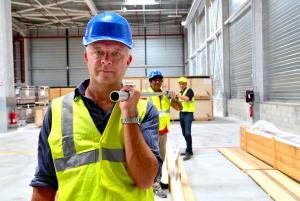Not your ordinary pipes
26 Sep 2016
-
R.A.
The typical pipe is made from a steel plate that is rolled to form a tube, and welded along its length. The nuclear world, however, is not fond of long welds ... especially in piping.
A 10-km network of seamless stainless steel pipes will connect vacuum pumps to the vacuum vessel, cryostat, and neutral beam injector. Vacuum team members Liam Worth (forefront) and Bansal Gourab received their first order last week from contractor Global Nuclear Metal Supply (GNMS).
Because pipes are often located in places difficult to access, the regular inspections and radiographic examination that safety regulations require would be a taxing and extremely expensive process. There would also be an increased risk of leaks not being detected by normal methods of non-destructive testing.
What the nuclear world prefers is the so-called seamless pipe—a pipe that is manufactured not by rolling and welding a flat surface, but by piercing and extruding a billet of hot metal to form a tube.
Such pipes come in standard lengths of 5 to 7 metres that are welded together to form networks, allowing for fewer, and more accessible, welds.
In ITER, this type of seamless pipe will be required for a 10-kilometre network that will connect powerful vacuum pumps to the vacuum vessel, cryostat, and neutral beam injector. This piping will act as an extension of the first nuclear confinement barrier, transporting the unburned tritium (along with ash and impurities) from the vacuum vessel and delivering it to the Tritium Plant for reprocessing.
The first order of seamless stainless-steel piping was delivered to ITER on 16 September, procured by the ITER Organization on behalf of the US under the terms of a specific agreement to centralize the procurement of vacuum pipework. The pipes were manufactured in Austria for the company Global Nuclear Metal Supply (GNMS).
"Our first order of seamless pipes for the vacuum system was deliberately small—only 80 metres," explain Liam Worth and Bansal Gourab, from the ITER Vacuum Section. "We'll use this first order as a test to verify that all procedures are observed and secured, before ordering the remaining scope (in three deliveries) from the supplier for arrival in 2017."
The Vacuum Section is pursuing the standardization of vacuum components, including piping and vacuum instrumentation, as a way for the ITER Organization and Domestic Agencies to save cost on the qualification and order of mass-purchase items.


